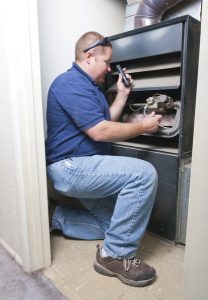 You can learn a lot about the condition of your furnace by listening to it. Now don’t get us wrong… We’re not implying that we’re mystical furnace gurus who can actually communicate with furnaces. We’re just going off our experience and our expertise on heaters!
You can learn a lot about the condition of your furnace by listening to it. Now don’t get us wrong… We’re not implying that we’re mystical furnace gurus who can actually communicate with furnaces. We’re just going off our experience and our expertise on heaters!
There are many noises and strange behaviors your furnace can make, but in this post, we want to focus on one in particular: short-cycling. This is what happens when your furnace rapidly turns on and off. The first sign you’ll most likely notice is the sound of the furnace constantly clicking on and off. Keep reading, though, and you’ll understand how short-cycling is a sign from your furnace that it’s in danger.
The Problem With Short-Cycling
Your furnace is designed to cycle on and off, but at much slower intervals. A steady pace of persistent cycles ensures your home becomes warm in just the right way. If the furnace were to operate too quickly, the unit would shut off, and the home would quickly become cold again.
This is why most short-cycling problems have to do with overheating or with an oversized heater. When too much heat is generated, the thermostat or the furnace gets a false reading and is commanded to shut off. Yet, the house is still cold, so it quickly turns back on again. The cycling continues endlessly.
Short-Cycling Is a Huge Waste of Energy
There are a couple of big reasons why short-cycling is a drain on your home efficiency:
- Extended run time: The furnace will take much longer to heat the home to the desired temperature, if it’s able to reach it at all. Getting your home to a certain temperature will take several times more energy than is really necessary.
- Stress on the system: Starting up a furnace is a much more energy-intensive process than allowing it to run continuously. The constant starting won’t just be a drain on your energy, but it will force components like the start-capacitor to work overtime and lead to an early replacement.
- Increased repairs: Repairing the furnace every once in a while is just a fact of life, but if you throw short-cycling into the mix, you’ll be needing those repairs far sooner than you ever expected.
In other words, short-cycling needs to be dealt with as soon as possible before you’re forced to pay extra for it.
Then What Do We Do About Short-Cycling?
The first thing you’ll want to do is check the air filter. If it’s clogged and dirty, that could be the reason for your short-cycling. Even if it doesn’t look that dirty, try fixing it anyways to see if that fixes the problem. This would be the best-case scenario!
If that’s not doing the trick, then it could be a much more substantial problem. Short-cycling often happens when the installed furnace is too big for the space it’s heating. There’s nothing to do except to have it replaced.
But before you decide that on your own, we highly suggest simply calling in for furnace repair in Portland, OR. They’ll be able to thoroughly inspect the furnace and investigate all possibilities of repair.
